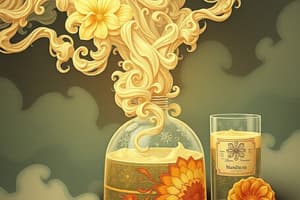Podcast
Questions and Answers
What does vapor pressure refer to in chemistry?
What does vapor pressure refer to in chemistry?
- The pressure exerted by solid molecules above a liquid at equilibrium
- The pressure exerted by liquid molecules above a solid substance
- The pressure exerted by gas molecules above a liquid at equilibrium (correct)
- The pressure exerted by liquid molecules above a gas substance
How does an increase in a liquid's vapor pressure affect its rate of evaporation?
How does an increase in a liquid's vapor pressure affect its rate of evaporation?
- Has no effect on the rate of evaporation
- Increases the rate of evaporation (correct)
- Causes the liquid to freeze
- Decreases the rate of evaporation
What factor influences vapor pressure by causing more molecules to escape the liquid surface?
What factor influences vapor pressure by causing more molecules to escape the liquid surface?
- Increase in temperature (correct)
- Increase in solid molecules
- Decrease in substance composition
- Decrease in temperature
How does substance composition affect vapor pressure?
How does substance composition affect vapor pressure?
In the context of vapor pressure, what happens as the temperature of a substance increases?
In the context of vapor pressure, what happens as the temperature of a substance increases?
How does an increase in temperature generally affect vapor pressure?
How does an increase in temperature generally affect vapor pressure?
What effect does the presence of impurities have on the vapor pressure of a substance?
What effect does the presence of impurities have on the vapor pressure of a substance?
How does the vapor pressure of a substance change with an increase in pressure?
How does the vapor pressure of a substance change with an increase in pressure?
What is the equilibrium cell method used for in measuring vapor pressure?
What is the equilibrium cell method used for in measuring vapor pressure?
In what field do pharmaceutical companies use knowledge of vapor pressure?
In what field do pharmaceutical companies use knowledge of vapor pressure?
What do volatile organic compounds (VOCs) have the propensity to do, according to the text?
What do volatile organic compounds (VOCs) have the propensity to do, according to the text?
How does understanding vapor pressure benefit our exploration of substances, based on the text?
How does understanding vapor pressure benefit our exploration of substances, based on the text?
Flashcards are hidden until you start studying
Study Notes
Exploring the Vapor Pressure of Liquids in Chemistry
In the realm of chemistry, the behavior of substances as liquids and gases is a fundamental concept that enables us to understand processes like evaporation, boiling, and phase transitions. One of the key properties that govern these behaviors is vapor pressure, which we'll dive into here.
Vapor pressure refers to the pressure exerted by gas molecules above a liquid or solid substance at equilibrium. It's a critical property because it dictates the rate at which a substance evaporates or condenses. As a liquid's vapor pressure increases, the rate of evaporation increases, and the substance becomes more volatile.
To better understand vapor pressure, let's consider a simple experiment. Imagine a beaker of water at room temperature. Water molecules are always in motion, and some of them possess enough energy to escape the surface of the liquid and enter the gaseous phase, forming a vapor above the liquid. The rate at which water molecules escape is determined by the vapor pressure of water at that temperature.
Factors that Affect Vapor Pressure
Numerous factors influence vapor pressure, including:
-
Temperature: As temperature increases, the average kinetic energy of particles also increases, causing more molecules to obtain sufficient energy to escape the liquid surface. Thus, vapor pressure generally increases with temperature.
-
Substance: The composition of the substance affects its vapor pressure. For example, gases like hydrogen and helium have much higher vapor pressures than liquids like water and ethanol.
-
Purity: The presence of impurities or solutes can decrease the vapor pressure of a substance. For example, dissolving salt in water lowers the vapor pressure of water.
-
Pressure: At higher pressures, the vapor pressure of a substance increases.
Measuring Vapor Pressure
In chemistry, several methods are employed to measure vapor pressure. One such technique is the equilibrium cell method, which involves comparing the pressure in two chambers containing the same liquid at different temperatures. As the temperature increases, the vapor pressure increases, causing an increase in the pressure in the chamber containing the liquid.
Another method is the manometer method, which involves measuring the pressure exerted by the vapor on a liquid column in a manometer tube. By measuring the height of the liquid column, we can calculate the vapor pressure.
Applications of Vapor Pressure
Understanding vapor pressure has numerous applications in various fields of chemistry. For instance, pharmaceutical companies use it to design drug delivery systems, such as inhalers or transdermal patches, which rely on the controlled release of volatile substances.
Moreover, knowledge of vapor pressure is crucial in environmental science, where it helps predict the propensity of volatile organic compounds (VOCs) to contaminate the atmosphere.
In summary, vapor pressure is an essential property that governs the rate of evaporation and condensation of substances. Understanding its various factors, methods for measuring it, and its applications in chemistry and related fields equips us with a powerful tool to explore and harness the behavior of substances in their various forms.
Studying That Suits You
Use AI to generate personalized quizzes and flashcards to suit your learning preferences.




